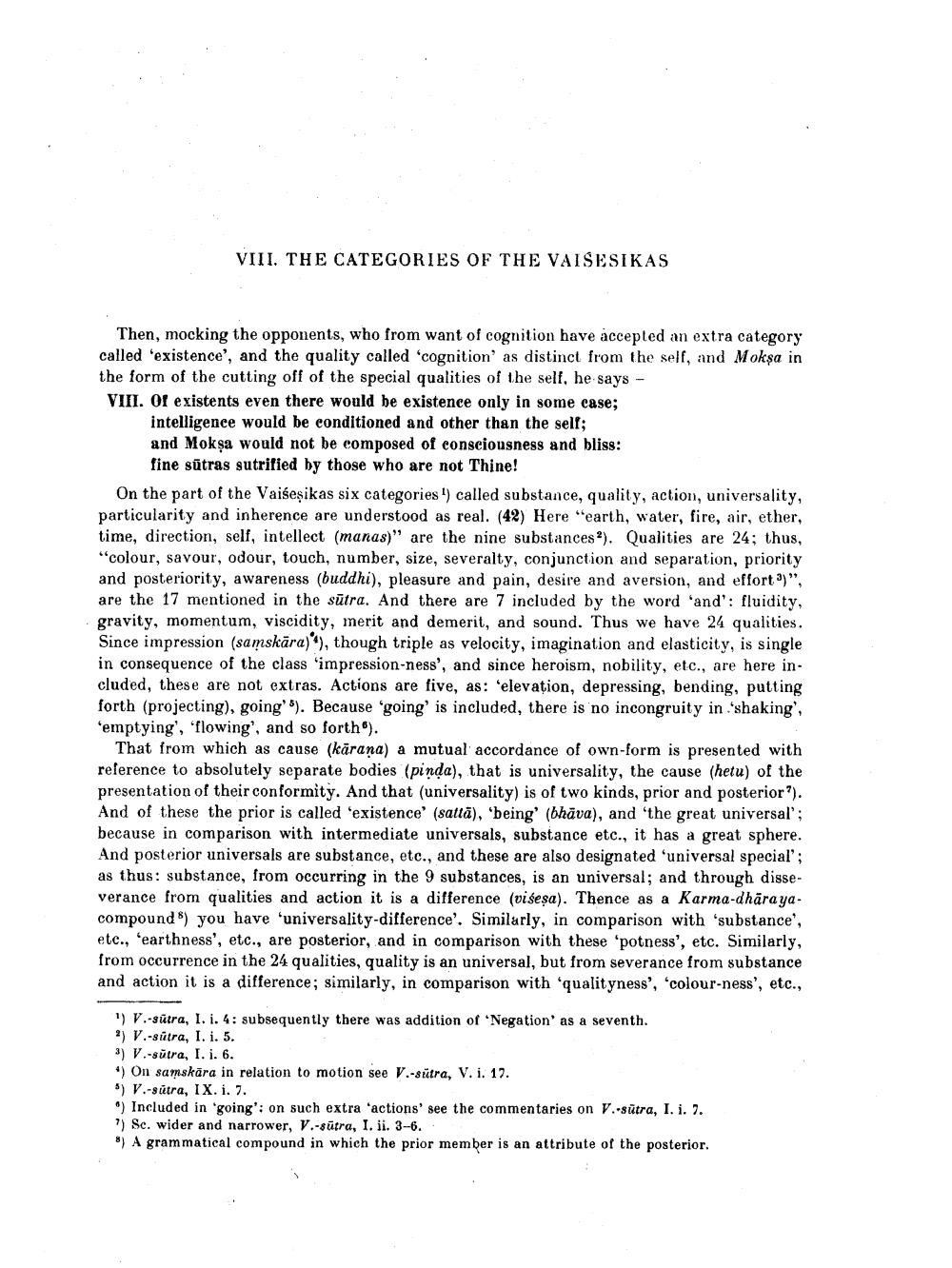________________
VIII. THE CATEGORIES OF THE VAISESIKAS
Then, mocking the opponents, who from want of cognition have accepted an extra category called 'existence', and the quality called 'cognition' as distinct from the self, and Mokşa in the form of the cutting off of the special qualities of the self, he says -
VIII. Of existents even there would be existence only in some case;
intelligence would be conditioned and other than the self;
and Mokṣa would not be composed of consciousness and bliss: fine sutras sutrified by those who are not Thine!
On the part of the Vaiseşikas six categories 1) called substance, quality, action, universality, particularity and inherence are understood as real. (42) Here "earth, water, fire, air, ether, time, direction, self, intellect (manas)" are the nine substances). Qualities are 24; thus, "colour, savour, odour, touch, number, size, severalty, conjunction and separation, priority and posteriority, awareness (buddhi), pleasure and pain, desire and aversion, and effort ")", are the 17 mentioned in the sutra. And there are 7 included by the word 'and': fluidity, gravity, momentum, viscidity, merit and demerit, and sound. Thus we have 24 qualities. Since impression (samskära)), though triple as velocity, imagination and elasticity, is single in consequence of the class 'impression-ness', and since heroism, nobility, etc., are here included, these are not extras. Actions are five, as: 'elevation, depressing, bending, putting forth (projecting), going). Because 'going' is included, there is no incongruity in 'shaking'. 'emptying', 'flowing', and so forth).
That from which as cause (karana) a mutual accordance of own-form is presented with reference to absolutely separate bodies (pinda), that is universality, the cause (hetu) of the presentation of their conformity. And that (universality) is of two kinds, prior and posterior"). And of these the prior is called 'existence' (satta), 'being' (bhava), and 'the great universal'; because in comparison with intermediate universals, substance etc., it has a great sphere. And posterior universals are substance, etc., and these are also designated 'universal special'; as thus: substance, from occurring in the 9 substances, is an universal; and through disseverance from qualities and action it is a difference (viseṣa). Thence as a Karma-dhārayacompound) you have 'universality-difference". Similarly, in comparison with 'substance', etc., 'earthness', etc., are posterior, and in comparison with these 'potness', etc. Similarly, from occurrence in the 24 qualities, quality is an universal, but from severance from substance and action it is a difference; similarly, in comparison with 'qualityness', 'colour-ness', etc.,
1) V.-sutra, I. i. 4: subsequently there was addition of 'Negation' as a seventh.
2) V.-sutra, I. i. 5.
3) V.-sutra, I. i. 6.
*) On samskära in relation to motion see V.-sutra, V. i. 17.
5) V.-sutra, IX. i. 7.
*) Included in 'going': on such extra 'actions' see the commentaries on V.-sutra, I. i. 7.
7) Sc. wider and narrower, V.-sutra, I. ii. 3-6.
8) A grammatical compound in which the prior member is an attribute of the posterior.




